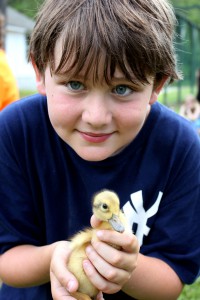When I was asked to be a “guest blogger” I started thinking about the start of the summer and in particular, arriving at camp. Arrival Day is a big deal. Some people find it exciting, some totally overwhelming … and I’m talking about everyone: campers, families, staff, newcomers and returners. I come from the UK, where camp isn’t nearly as much a “way of life” as it is for many in the US. When I first started my camp career many years ago, I wasn’t entirely sure what to expect. Yes, I’d seen movies set at camps and read all of the information that I’d been sent, but it was all a bit of a voyage into the unknown. I had my safety net though, as I knew a couple of people at that camp. Years later, when I started working at Akeela, it was a different story. This time I knew the basics of camp life but didn’t know anybody at Akeela. I’d spoken with Debbie and Eric on Skype, but that was it. Both very nerve-wracking experiences, but both very positive experiences. I was made to feel so welcome at each, and quickly came to feel like a part of the family.
Over the years, I’ve seen many different ways of people handling their emotions on Arrival Day. From those who arrive filled with energy, eager to see old friends and have new experiences, to those who experience more difficulty with their transition: the camper who refused to enter their cabin because “it smells of wood”, the boy who refused to speak for 8 days and would only communicate by scribbling notes, the girl who was so over-stimulated that she couldn’t stop talking, barely even pausing to draw breath.
The arrival that will stay with me forever though, comes from my second year as a Unit Leader at my old camp. Arrival Day was going smoothly, and eventually the time came when the buses arrived, and everyone had arrived. I was performing my duties and checking people off on my list, when I realized that one was missing. At pretty much the same moment, my walkie-talkie crackled into life and asked me to make my way to the Health Center. When I arrived I was confronted with the sight of a young man, sobbing and on the verge of hysteria. One of the nurses pulled me to one side and told me that he’d been like this for a lot of the bus ride, and so they got him off the bus at the office and brought him straight to the Health Center to try and calm him down. I sat down and talked to him for a good couple of hours. I found out that he was homesick, that this was the first time he had been so far away from home and that he thought that he had made a big mistake coming to camp for the summer. Over the two hours, he calmed down a lot, and when I eventually asked him if he felt ready to go down to the bunk and meet people he nervously agreed.
The thing is that this was not Camper Arrival Day, it was the Staff Arrival Day! Martijn was a 22 year old counselor who had come on his own from the Netherlands. Well, it took Martijn a few days to come out of his shell, but he turned out to be one of the most empathetic and engaging counselors I have ever had the privilege of working with. He came back to camp for three years and did some fantastic work with the campers that were placed in his care. We’re still in touch to this day, and he always reminds me of his inauspicious arrival and how he didn’t think he would make it that summer, and I think that’s what will stay with me.
In fact, I suppose that’s what I’m trying to say in this blog. No matter how nervous you feel about coming to camp, we’ll do our very best to help you through it and get you to have an amazing summer. Everyone that I’ve mentioned here went on to have a great time and made new friends, enjoyed their activities and did better than they thought they would with being away from home. Sometimes these things aren’t the easiest, and that’s OK – but there are always people who are there to help and make you feel better.
– Rob Glyn-Jones
Camp Akeela Head Counselor

 It seems that MINDFULNESS is the new “buzz word” these days. Even our first-grade daughter is learning mindfulness in school! As a therapist, I had a basic understanding of meditation and the scientific research that has demonstrated that a relaxed brain is a healthier brain and can also decrease stress and the impacts of stress on the body. On a cognitive level, meditation for children on the autism spectrum has always made sense to me. AND, I always felt that I couldn’t “do” it. My brain moved too fast and thoughts were always running through my mind. I couldn’t sit still for more than 5 minutes before I got bored and decided that meditation just wasn’t for me.
It seems that MINDFULNESS is the new “buzz word” these days. Even our first-grade daughter is learning mindfulness in school! As a therapist, I had a basic understanding of meditation and the scientific research that has demonstrated that a relaxed brain is a healthier brain and can also decrease stress and the impacts of stress on the body. On a cognitive level, meditation for children on the autism spectrum has always made sense to me. AND, I always felt that I couldn’t “do” it. My brain moved too fast and thoughts were always running through my mind. I couldn’t sit still for more than 5 minutes before I got bored and decided that meditation just wasn’t for me.

 Check out
Check out